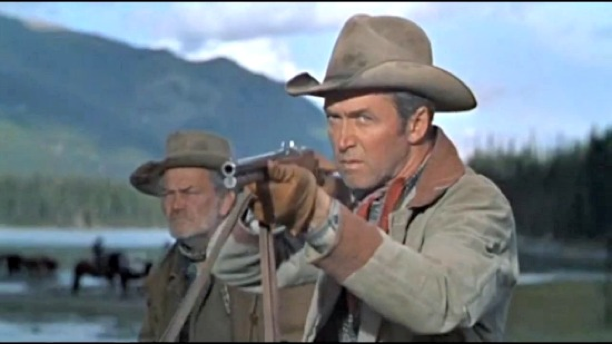The enduring legends of the 1890’s Klondike Gold Rush were more than enticing enough to lure Hollywood away from the rocky plateau of Monument Valley for a spell. This gave filmmakers an opportunity to cast their usual Western fare against majestic mountain backdrops spinning tales of prospectors and crooks duking it out over gold claims with such violence that you can’t help but wonder when Sam Steele will show up to restore order.
The Mounties take a back seat in this 1954 picture from director Anthony Mann however, as Wyoming cowboy Jeff Webster (James Stewart) heads north with sidekick Ben Tatum (Walter Brennan) to strike it rich and escape the authorities after shooting two men who tried to steal his cattle on a drive. He quickly runs afoul of the law again in Alaska however, as crooked self-appointed Judge Gannon (John McIntire) confiscates the cattle he intended to sell. Jeff and Ben swiftly steal them back and cross the border into the Yukon with Gannon swearing vengeance.
The cowboys land in Dawson City to find friendly prospecting folk there including spirited French-Canadian girl Renee (Corinne Calvet) who swifty develops a crush on Jeff. Most of the citizens intend to settle and build a proper town complete with courthouse and school. But just as Jeff and Ben’s claim begins to bear fruit, Gannon and his cronies roll into town and promptly begin to jump every claim in sight, gunning down any man who dares to stand in their way.
With only one absentee Mountie posted for the whole Yukon Territory, the townsfolk take it upon themselves to elect a Marshall to restore order to Dawson. While Jeff is naturally the favourite candidate, he is reluctant to accept the responsibility as life has moulded him to look out only for number one. But when tragedy strikes, Jeff decides to rise to the challenge and resolves to rid the Klondike of Judge Gannon and his goons once and for all.
The Far Country is a well-told, satisfying “Northwestern” that takes classic archetypes and distributes them to a first-rate cast. Stewart is in fine form as the film’s loner cowboy star. The actor handily portrays the years of trials and tribulations on the wild frontier that have worn Jeff down and distanced him from his fellow man while a spark of warmth and honour still shines below the surface. John McIntire steals nearly every scene he’s in as the deliciously evil Judge Gannon. Clearly riffing on the legendary Soapy Smith of Skagway, McIntire proves a deft foil for Stewart leaving their inevitable battle in the final act a thrilling one. Corrine Calvet adds a colourful (if not stereotyped) Canadian character to the overwhelmingly American proceedings and the remaining cast is rounded out by familiar faces including Ruth Roman (Strangers on a Train), Harry Morgan (Dragnet), and Kathleen Freeman (Singin’ in the Rain).
The film substitutes Alberta’s Jasper National Park for the Klondike here and the Technicolor cinematography shows it off to stunning effect (even if it does use the Athabasca Glacier a few too many times). The majority of the film is the result of this location shoot which adds welcome scope to the picture and firmly separates it from the usual desert-bound western.
As entertaining as the final product is, it should be pointed out the rather glaring historical inaccuracy inherent in the story. Aside from some glaring technical errors such as the characters taking a riverboat all the way from Seattle to Skagway and the head-scratching ease of driving cattle across the Yukon border to Dawson, the film completely mis-represents the presence of the North West Mounted Police in the Klondike at the time.
Historically, the mounties maintained a strong presence in the Yukon enforcing the law to such a degree that the territory was a virtual British Police State. It’s utterly inconceivable that someone like Gannon and his men would be permitted to wreak such havoc in the territory and even more so that a new American-style sheriff in town would be the one to put an end to such lawlessness.
Furthermore, there is a noticeable lack of Indigenous presence in the story with the local Chilkat people only passingly referred to on a couple occasions; a curious omission as the Chilkat were in fact making big money ferrying mining supplies through mountain passes at the time. It is anachronisms like this that brought historians like Pierre Berton no end of grief, but as a film lover, I’m a little more forgiving of such transgressions in the name of drama.
For all it’s failings as an accurate history lesson of the place and time, The Far Country provides a thrilling, character-driven story against a breathtaking backdrop and at the end of the day, isn’t that what most of us want from our movies? In the end, it’s best to suspend your sense of history and enjoy this trans-planted western for what it is.
7.5/10

